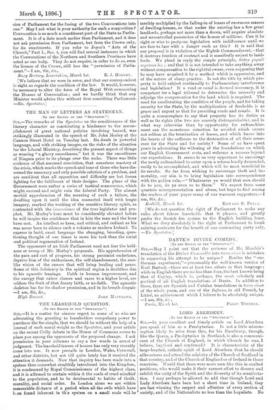THE LEASEHOLD QUESTION.
LTo THE EDITOR OF THE 'SPECTATOR?'] SIR,—It is a matter for sincere regret to some of us who are advocating the granting to leaseholders compulsory power to purchase the fee.simple, that we should be without the help of a journal of such moral weight as the Spectator, and your article on the recent Crilly debate in the House of Commons seems to place you among the opponents of the proposed change. I ask permission in your columns to say a few words in arrest of judgment. The leasehold tenure of houses has only very recently come into use. It now prevails in London, Wales, Cornwall, and other districts, but not till quite lately has it received the attention it demands. Now that inquiry has been made into a system thus somewhat stealthily introduced into the Kingdom, it is condemned by Royal Commissioners of the highest class, and it is affirmed to contain within it the seeds of cruel mischief to the population, and to be detrimental to habits of thrift, morality, and social order. In London alone we are within measurable distance of a period when all the evils which have bzen found inherent in th's system on a small scale will be
terribly multiplied by the falling-in of leases of enormous masses of dwelling-houses, so that under the existing law a few great landlords, perhaps not more than a dozen, will acquire absolute and uncontrolled possession of the homes of millions. Can it be right or wise to postpone legislation with indifference until we are face to face with a danger such as this ? It is said that our proposal is in violation of the Eighth Commandment, —that it destroys freedom of contract and is manifestly unjust to land- lords. We plead in reply the simple principle, Salve ropuli suprenza lee ; and that it is not intended to take anything away without compensation to the rightful owner, even supposing that he may have acquired it by a method which is oppressive, and of the nature of sharp practice. Is not the title by which pro- perty is held subject continually to Parliamentary interference and legislation ? If a road or canal is deemed necessary, it is competent for a legal tribunal to determine the necessity and adjudge the compensation for the land which is required. The need for ameliorating the condition of the people, and for taking security for the State, by the multiplication of freeholds is as grave and urgent as that for providing roads and canals. It is quite a commonplace to say that property has its duties as well as its rights (the two are scarcely distinguishable), and in what way otherwise than by opportunity for enfranchise- ment can the monstrous extortion be avoided which occurs not seldom at the termination of leases, and which burns into the hearts of the sufferers to the destruction of all their rever- ence for the State and for society Some of us have spent years in advocating the widening of the foundations on which our English Government rests, and welcome a success beyond our expectations. It seems to us very opportune to encourage the newly enfranchised to enter upon a reform loudly demanded, easily to be accomplished, and which will be most beneficial in its results. So far from wishing to encourage theft and im- morality, our aim is to bring legislation into correspondence with the golden rule,—" Whatsoever ye would that men should do to you, do ye even so to them." We expect from some quarters misrepresentation and abuse, but hope to find among the readers of your paper many of our warmest supporters.—I am, Sir. &c., Redhill, March 1st. EDWARD S. PRYCE.
[We do not question the right of Parliament to make any rules about future leaseholds that it pleases, and greatly prefer the Scotch feu system to the English building lease. What we deny absolutely is the right of Parliament to break existing contracts for the benefit of one contracting party only. —En Spectator.]


































 Previous page
Previous page